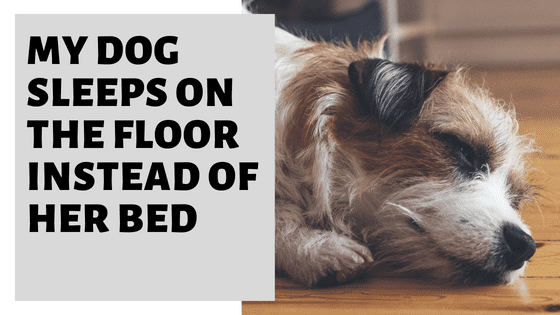Have you ever caught your furry friend curled up on the cold, hard floor instead of their cozy dog bed, or even your bed? It can be a little baffling, especially when you’ve spent a fortune on a plush, inviting bed just for them! While your dog might be a master of cozying up in unexpected places, there could be reasons behind this behavior that go beyond just a preference for hard surfaces.

Image: peteducate.com
This article will explore the various reasons behind dogs sleeping on the floor. We’ll address potential health concerns, environmental factors, and even personality traits that might be contributing to this seemingly strange behavior. We will delve into how to understand your furry friend’s preferences and, if necessary, help them transition back to a more comfortable sleeping arrangement.
Uncovering the Mystery: Why Does My Dog Choose the Floor?
First, recognize that every dog is an individual. Their sleep preferences can vary greatly, just like ours. What might seem odd to us could be perfectly normal for our canine companions.
Here are some common reasons why your dog might choose the floor over the bed:
1. Temperature Regulation: Dogs, like other mammals, have a specific temperature range they need to maintain for optimal health. If your dog is feeling too hot, they might seek a cooler spot on the floor. Conversely, some dogs may feel more comfortable on the floor during colder months, especially if they have thin or short fur.
2. Security and Comfort: Dogs are instinctively pack animals, and a floor position can provide a sense of security, especially if they are nervous or feeling vulnerable. The floor allows them to feel more grounded and may provide a sense of control over their surroundings. A dog might also prefer a flat surface for spreading out and relaxing, particularly if they are large or have joint pain.
3. Scent Preference: Dogs have a much stronger sense of smell than humans. The floor can contain a variety of scents and pheromones that are familiar and comforting to your dog. This might be due to a preference for their own scent, familiar household smells, or even the scent of other pets.
4. Health Concerns: If your dog suddenly starts sleeping on the floor when they previously used a bed, it’s essential to rule out underlying health problems. Joint pain, arthritis, or even internal discomfort can make it difficult for a dog to sleep comfortably on a bed, especially if they have to climb up and down.
5. Behavioral Reasons: It might seem strange, but some dogs might prefer the floor because they perceive it as a ‘safer’ place for sleeping. They might be fearful of getting too close to you or being disturbed in their sleep.
Understanding Your Dog’s Individual Preferences:
Pay Attention to the Clues: Observe your dog’s behavior carefully. Do they seem agitated or restless when sleeping on the bed? Do they have difficulty getting up and down? Are they excessively licking or scratching at a particular area? These signs can provide valuable insight into their preferences and potential health concerns.
Environment: Consider your dog’s sleeping environment. Is the room too warm or too cold? Is the bed too high or too small? Are there any drafts or noise that might be disturbing their sleep?
Sleep Schedule: Dogs, like us, have routines and habits. Observe if there are specific times of day or night when your dog prefers the floor. This could provide a hint about their sleep preferences or underlying conditions.
Helping Your Dog Transition Back to the Bed:
Gradual Adjustments: Don’t force your dog to sleep on the bed if they show resistance. Instead, try placing a blanket or towel on the floor next to the bed and gradually move it closer to the bed over time.
Make it Comfortable: Ensure the bed is the right size and height for your dog. Choose a comfortable, supportive surface, and add a warm, cozy blanket.
Reinforcement and Rewards: If your dog does sleep on the bed, praise and reward them with a treat or a toy to encourage the behavior.
Health Check-Up: If you suspect underlying health issues are causing your dog to sleep on the floor, schedule a visit to your veterinarian for a checkup.
Consulting a Professional: If you are unable to understand your dog’s behavior or if their sleeping habits are significantly impacting their quality of life, consult a certified animal behaviorist.

Image: www.lovinglocal.com.au
Dog Sleeps On Floor Instead Of Bed
Final Thoughts:
Your dog’s choice of sleeping surface is a reflection of their individual preferences, environment, and health. While it’s natural to want what’s best for your furry friend, it’s important to respect their choices and provide them with a comfortable and safe space to sleep. Remember to be patient, understanding, and always prioritize their well-being. Your dog will appreciate your efforts to provide them with the most restful and enjoyable sleep possible.






